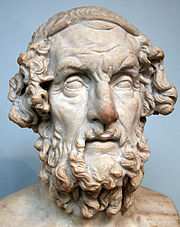
Back Абырзен бызшәа Abkhazian Урымыбзэ ADY Grieks Afrikaans Griechische Sprache ALS ግሪክ (ቋንቋ) Amharic Idioma griego AN Crēacisc sprǣc ANG ग्रीक भाषा ANP اللغة اليونانية Arabic ܠܫܢܐ ܝܘܢܝܐ ARC
| Greek | |
|---|---|
| Ελληνικά Elliniká | |
| Pronunciation | [eliniˈka] |
| Native to |
|
| Ethnicity | Greeks |
Native speakers | 13.5 million (2012)[1] |
Indo-European
| |
Early form | |
| Dialects | |
| Greek alphabet | |
| Official status | |
Official language in | |
Recognised minority language in | |
| Language codes | |
| ISO 639-1 | el |
| ISO 639-2 | gre (B) ell (T) |
| ISO 639-3 | Variously:ell – Modern Greekgrc – Ancient Greekcpg – Cappadocian Greekgmy – Mycenaean Greekpnt – Pontictsd – Tsakonianyej – Yevanic |
| Glottolog | gree1276 |
| Linguasphere |
|
 Areas where Modern Greek is spoken (Dark blue represents areas where it is the official language.)[note 1] | |
Greek (Modern Greek: Ελληνικά, romanized: Elliniká, [eliniˈka]; Ancient Greek: Ἑλληνική, romanized: Hellēnikḗ) is an Indo-European language, constituting an independent Hellenic branch within the Indo-European language family. It is native to Greece, Cyprus, Italy (in Calabria and in Apulia, precisely in Salento), southern Albania, and other regions of the Balkans, Caucasus, the Black Sea coast, Asia Minor, and the Eastern Mediterranean. It has the longest documented history of any Indo-European language, spanning at least 3,400 years of written records.[10] Its writing system is the Greek alphabet, which has been used for approximately 2,800 years;[11][12] previously, Greek was recorded in writing systems such as Linear B and the Cypriot syllabary.[13] The alphabet arose from the Phoenician script and was in turn the basis of the Latin, Cyrillic, Coptic, Gothic, and many other writing systems.
The Greek language holds a very important place in the history of the Western world. Beginning with the epics of Homer, ancient Greek literature includes many works of lasting importance in the European canon. Greek is also the language in which many of the foundational texts in science and philosophy were originally composed. The New Testament of the Christian Bible was also originally written in Greek.[14][15] Together with the Latin texts and traditions of the Roman world, the Greek texts and Greek societies of antiquity constitute the objects of study of the discipline of Classics.
During antiquity, Greek was by far the most widely spoken lingua franca in the Mediterranean world.[16] It eventually became the official language of the Byzantine Empire and developed into Medieval Greek.[17] In its modern form, Greek is the official language of Greece and Cyprus and one of the 24 official languages of the European Union. It is spoken by at least 13.5 million people today in Greece, Cyprus, Italy, Albania, Turkey, and the many other countries of the Greek diaspora.
Greek roots have been widely used for centuries and continue to be widely used to coin new words in other languages; Greek and Latin are the predominant sources of international scientific vocabulary.

- ^ Greek at Ethnologue (18th ed., 2015) (subscription required)
Ancient Greek at Ethnologue (18th ed., 2015) (subscription required)
Cappadocian Greek at Ethnologue (18th ed., 2015) (subscription required)
Mycenaean Greek at Ethnologue (18th ed., 2015) (subscription required)
Pontic at Ethnologue (18th ed., 2015) (subscription required)
Tsakonian at Ethnologue (18th ed., 2015) (subscription required)
(Additional references under 'Language codes' in the information box) - ^ 2006 Census Table: Language Spoken at Home by Sex – Time Series Statistics (1996, 2001, 2006 Census Years)
- ^ Αυστραλία: Τηλεδιάσκεψη «Μιλάμε Ελληνικά τον Μάρτιο»
- ^ Tsitselikis 2013, pp. 287–288.
- ^ Cite error: The named reference
Toktaş2006was invoked but never defined (see the help page). - ^ Cite error: The named reference
Bayır2013was invoked but never defined (see the help page). - ^ Cite error: The named reference
HRWLanguageRightswas invoked but never defined (see the help page). - ^ "Language Use in the United States: 2011" (PDF). United States Census. Retrieved 17 October 2015.
- ^ "gree1276". Council of Europe. Retrieved 8 December 2008.
- ^ "Greek language". Encyclopædia Britannica. Encyclopædia Britannica, Inc. Retrieved 29 April 2014.
- ^ Haviland, William A.; Prins, Harald E. L.; Walrath, Dana; McBride, Bunny (2013). "Chapter 15: Language and Communication". Anthropology: The Human Challenge. Cengage Learning. p. 394. ISBN 978-1-285-67758-3.
Most of the alphabets used today descended from the Phoenician one. The Greeks adopted it about 2,800 years ago, modifying the characters to suit sounds in their own language.
- ^ Comrie, Bernard (1987). The World's Major Languages. Routledge (published 2018). ISBN 978-1-317-29049-0.
... the Greek alphabet has served the Greek language well for some 2,800 years since its introduction into Greece in the tenth or ninth century BC.
- ^ Adrados, Francisco Rodríguez (2005). A history of the Greek language : from its origins to the present. Leiden: Brill. ISBN 978-90-04-12835-4. OCLC 59712402.
- ^ Kurt Aland, Barbara Aland The text of the New Testament: an introduction to the critical 1995 p. 52.
- ^ Archibald Macbride Hunter Introducing the New Testament 1972 p. 9.
- ^ Malkin, Irad (2011). A small Greek world : networks in the Ancient Mediterranean. Oxford University Press. doi:10.1093/acprof:oso/9780199734818.001.0001. ISBN 9780199918553.
- ^ Manuel, Germaine Catherine (1989). A study of the preservation of the classical tradition in the education, language, and literature of the Byzantine Empire. HVD ALEPH.
{{cite book}}: CS1 maint: location missing publisher (link)
Cite error: There are <ref group=note> tags on this page, but the references will not show without a {{reflist|group=note}} template (see the help page).